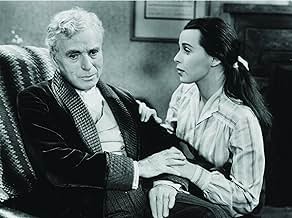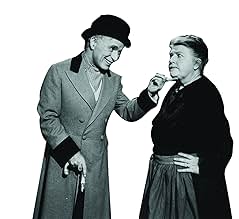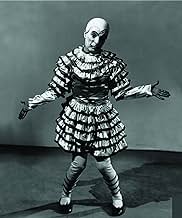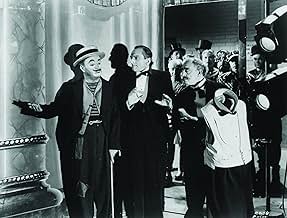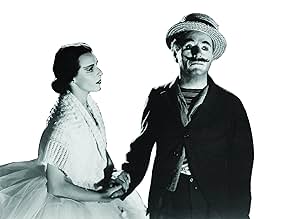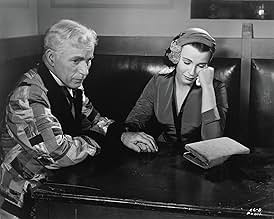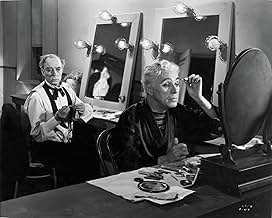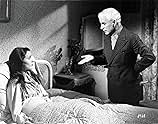AVALIAÇÃO DA IMDb
8,0/10
23 mil
SUA AVALIAÇÃO
Um comediante em desvanecimento e uma dançarina de balé suicida e desanimada devem olhar um para o outro para encontrar um propósito e esperança em suas vidas.Um comediante em desvanecimento e uma dançarina de balé suicida e desanimada devem olhar um para o outro para encontrar um propósito e esperança em suas vidas.Um comediante em desvanecimento e uma dançarina de balé suicida e desanimada devem olhar um para o outro para encontrar um propósito e esperança em suas vidas.
- Ganhou 1 Oscar
- 7 vitórias e 4 indicações no total
Molly Glessing
- Maid
- (as Mollie Glessing)
Leonard Mudie
- Dr. Blake - Calvero's Doctor
- (as Leonard Mudi)
'Snub' Pollard
- Street Musician
- (as Snub Pollard)
Billy Lee Aimone
- Little Boy
- (não creditado)
Avaliações em destaque
Most ordinary people fall into a role and a persona in their lives, and tend to not veer very far from it if it provides for them. Perhaps, due to extreme situations, they may find it necessary to reinvent themselves once or twice and rise to the occasion or fall into dissolution.
An artist like Chaplain had to reinvent himself over and over again over four decades, particularly in a medium that was changing every few years. That's probably why he had so many failed marriages with younger woman; he had to feel like a "player" to keep the flow going and fight back the doubt and anxiety (and the terror of becoming irrelevant) that inevitably begins to haunt creative men in their twilight years. Don't underestimate the power of sex magic!
Limelight is a film about those demons, and the immense courage (and yes, the love of a much younger woman, too, doesn't hurt), that is required to triumph over them. Still, everyone knows there is one specter that no man can outrun -- Death. Chaplain masks this existential dimension in layers of sentimental melodrama which you will have to decide for yourself is effective, but I think he does this intentionally to smuggle in some deep and darker themes that filmmakers like Bergman would become famous for continually exploring masterfully.
I found myself going back and forth with Limelight; there are times when the melodrama overpowers the film, and the pedestrian cinematography doesn't help matters. A few times I felt like I was watching the old Abbot and Costello TV show, particularly the apartment scenes. However, Chaplain is such an immense presence you can't help be engaged and encouraged to keep watching because you want so much for his character Calvero to triumph. His co-star, Claire Bloom, is quite effective, too, and she has several "looks" in this film to contrast and mirror the ongoing struggle the old comedian in having internally.
Getting on in years myself, and feeling washed up and without hope and purpose, Calvero's plight and faltering desire to once again command the Limelight was quite cathartic. I was amazed by his final performance with Keaton; when Calvero starts rocking that violin like Eddie Van Halen in his prime, I was in a state of sublime fascination. Here was a true artist giving everything up for his audience, feeling the peak thrill of having the audience at his command once again for a few fleeting moments; a thrill that, tragically, he will pay dearly for.
We can only hope that we, too, can earn such an exalted death as Calvero's. Perhaps that is Chaplain's hidden message in this film; that life is, in the final analysis, about striving for a death that ennobles those you leave behind.
An artist like Chaplain had to reinvent himself over and over again over four decades, particularly in a medium that was changing every few years. That's probably why he had so many failed marriages with younger woman; he had to feel like a "player" to keep the flow going and fight back the doubt and anxiety (and the terror of becoming irrelevant) that inevitably begins to haunt creative men in their twilight years. Don't underestimate the power of sex magic!
Limelight is a film about those demons, and the immense courage (and yes, the love of a much younger woman, too, doesn't hurt), that is required to triumph over them. Still, everyone knows there is one specter that no man can outrun -- Death. Chaplain masks this existential dimension in layers of sentimental melodrama which you will have to decide for yourself is effective, but I think he does this intentionally to smuggle in some deep and darker themes that filmmakers like Bergman would become famous for continually exploring masterfully.
I found myself going back and forth with Limelight; there are times when the melodrama overpowers the film, and the pedestrian cinematography doesn't help matters. A few times I felt like I was watching the old Abbot and Costello TV show, particularly the apartment scenes. However, Chaplain is such an immense presence you can't help be engaged and encouraged to keep watching because you want so much for his character Calvero to triumph. His co-star, Claire Bloom, is quite effective, too, and she has several "looks" in this film to contrast and mirror the ongoing struggle the old comedian in having internally.
Getting on in years myself, and feeling washed up and without hope and purpose, Calvero's plight and faltering desire to once again command the Limelight was quite cathartic. I was amazed by his final performance with Keaton; when Calvero starts rocking that violin like Eddie Van Halen in his prime, I was in a state of sublime fascination. Here was a true artist giving everything up for his audience, feeling the peak thrill of having the audience at his command once again for a few fleeting moments; a thrill that, tragically, he will pay dearly for.
We can only hope that we, too, can earn such an exalted death as Calvero's. Perhaps that is Chaplain's hidden message in this film; that life is, in the final analysis, about striving for a death that ennobles those you leave behind.
Permeated with profound melancholy, told with a wistful eye and heavily autobiographical in its depiction of events, Limelight concerns a fading comedian who's forced to deal with the loss of his popularity but finds purpose & hope by helping out a suicidal dancer. Anchored by excellent performances, the film is a powerfully moving & deeply personal effort from the great visionary.
Written, produced, directed & also composed by Charlie Chaplin (A Woman of Paris & Monsieur Verdoux), the story borrows ideas & events from the acclaimed filmmaker's own past & present life and finely balances hope with despair, stardom with obscurity, happiness with heartbreak & laughter with tears. It captures the power of kindness, the beauty of companionship & is an ode to life itself.
Chaplin also stars as the washed-out music hall comedian whose lost fame alludes to his own decreased popularity in the United States and the gaze, gestures & expressions with which he articulates his poignance & longing has a pitch-perfect conviction to it. Claire Boom is brilliant as well and her performance only gets stronger as plot progresses. And the two share a warm, wonderful chemistry together.
Overall, Limelight presents Charlie Chaplin making peace with his glorious past, acknowledging & accepting the realities of his place in the present world, and looking forward to his future with renewed hope. There are plenty of impressive scenes in this film but the most memorable one is where cinema's two greatest comedians unite for a gag together: a final coda on the stage that once was the playground of these screen legends.
Written, produced, directed & also composed by Charlie Chaplin (A Woman of Paris & Monsieur Verdoux), the story borrows ideas & events from the acclaimed filmmaker's own past & present life and finely balances hope with despair, stardom with obscurity, happiness with heartbreak & laughter with tears. It captures the power of kindness, the beauty of companionship & is an ode to life itself.
Chaplin also stars as the washed-out music hall comedian whose lost fame alludes to his own decreased popularity in the United States and the gaze, gestures & expressions with which he articulates his poignance & longing has a pitch-perfect conviction to it. Claire Boom is brilliant as well and her performance only gets stronger as plot progresses. And the two share a warm, wonderful chemistry together.
Overall, Limelight presents Charlie Chaplin making peace with his glorious past, acknowledging & accepting the realities of his place in the present world, and looking forward to his future with renewed hope. There are plenty of impressive scenes in this film but the most memorable one is where cinema's two greatest comedians unite for a gag together: a final coda on the stage that once was the playground of these screen legends.
A washed-up, formerly-famous Music Hall comic, Charlie Chaplin, saves a suicidal ballerina, Claire Bloom. In the process of giving her the hope to move on and succeed, he regains the confidence to return to the stage himself.
"Limelight" is a moving and autobiographical film that works as both a bittersweet drama and a mirror into the soul of one of the world's greatest film makers. I sometimes wondered if my affection for this film is based on my knowledge of Chaplin's life and career, and the parallels between "Limelight" and people and incidents in his own life. When I watch this film I see an artist standing naked at a crossroads before his audience, unsure where to go and what to do. However, I know the film does not require an advanced degree in Chaplin to enjoy. My wife, who could probably do little more than identify the Tramp in a lineup before marrying me, loved this film before she met me. I have also had the good fortune to see the film in a theater in New York and watch it work its wonders on an audience. Stylistically, it might be dated, but the magic lingers.
"Limelight" is best viewed as a drama with comedy rather than a comedy with drama. Outwardly, it is the simple story of a vulnerable youth who mistakes her gratitude for love, and an older man wise enough to know the difference. But it's more than that too. It's about an artist's nature, and the addictive power of applause. The Chaplin character, Calvero, knows how to make people laugh, but feels he has lost the ability to do so. He realizes he is at the end of his career, but he still hungers for one final moment in the limelight. The film is talky and philosophical, and, yes, a little pompous and pretentious at times too. It's almost as if Chaplin is trying to impart through words the simple joys and mystery of life he was once able to express effortlessly through simple slapstick alone. Does this flood of words mean Chaplin has lost his skills as a film maker? No. He still has the power to move.
"Limelight" is Chaplin's final masterpiece. It is one of my favorites. I prefer to think of it as his last film. Should this be your first Chaplin film? No. Start with films like "The Gold Rush," "City Lights," and "The Great Dictator." Come to know the comedian before you get to know the man.
"Limelight" is a moving and autobiographical film that works as both a bittersweet drama and a mirror into the soul of one of the world's greatest film makers. I sometimes wondered if my affection for this film is based on my knowledge of Chaplin's life and career, and the parallels between "Limelight" and people and incidents in his own life. When I watch this film I see an artist standing naked at a crossroads before his audience, unsure where to go and what to do. However, I know the film does not require an advanced degree in Chaplin to enjoy. My wife, who could probably do little more than identify the Tramp in a lineup before marrying me, loved this film before she met me. I have also had the good fortune to see the film in a theater in New York and watch it work its wonders on an audience. Stylistically, it might be dated, but the magic lingers.
"Limelight" is best viewed as a drama with comedy rather than a comedy with drama. Outwardly, it is the simple story of a vulnerable youth who mistakes her gratitude for love, and an older man wise enough to know the difference. But it's more than that too. It's about an artist's nature, and the addictive power of applause. The Chaplin character, Calvero, knows how to make people laugh, but feels he has lost the ability to do so. He realizes he is at the end of his career, but he still hungers for one final moment in the limelight. The film is talky and philosophical, and, yes, a little pompous and pretentious at times too. It's almost as if Chaplin is trying to impart through words the simple joys and mystery of life he was once able to express effortlessly through simple slapstick alone. Does this flood of words mean Chaplin has lost his skills as a film maker? No. He still has the power to move.
"Limelight" is Chaplin's final masterpiece. It is one of my favorites. I prefer to think of it as his last film. Should this be your first Chaplin film? No. Start with films like "The Gold Rush," "City Lights," and "The Great Dictator." Come to know the comedian before you get to know the man.
Haunting and unforgettable piece from Charles Chaplin that was nearly lost in the American cinema all together. It played in very few cities within the U.S. in 1952 and was never shown in Los Angeles due to the suspicion that the House of Un-American Acts Committee had concerning Chaplin (making no sense to me as Chaplin, who was British, was the polar opposite of a Communist from all indications). The film disappeared from U.S. soil and did not re-surface until some 20 years later in 1972 and Chaplin actually won an Oscar, with fellow scorers Raymond Rasch and Larry Russell, for this movie's original dramatic score (this was the only competitive Oscar Chaplin ever won). Chaplin stars as a washed-up vaudeville performer. He is now an elderly man (in his 60s when the film was made) and the spotlight is gone forever, even though he still secretly yearns for it. Chaplin discovers a very young ballet dancer (Claire Bloom) who has attempted suicide because she cannot handle being a performer. Naturally Chaplin cannot believe that this young, beautiful and talented woman would rather take her life than be a ballet performer (the fact that Chaplin yearns for her youth and the ability to be an entertainer again makes him bound and determined to get her back on her feet). He tries with all his might to get her performance-ready again, all the while he is also trying to resurrect the career that he lost long ago. Chaplin has a dream of a stunning performance he has on the stage, but when his act ends there is no one there to acknowledge him (one of, if not the saddest sequences I have ever seen on film). Soon it becomes obvious that Chaplin's time is running out and his desperation to have that one last piece of action engulfs his mind, body, heart and soul. "Limelight" is one of the most dramatic and intense pictures I have ever encountered. Chaplin's life and career had changed dramatically by 1952. The Little Tramp was no more, all movies had sound, some films were being made in color and the subject matter of motion pictures was slowly starting to change. In many ways Chaplin was trying to show the viewing public his life in celluloid form and "Limelight" would be the vehicle used. This is a stunning work that once again shows the humanity and overall sensitivity that Chaplin had with his movies. Chaplin's long-time rival in real-life (Buster Keaton) even shows up late and acts as a partner in the duo's stage routine. The pairing is usually the most memorable part of this production to most, but the story and the deep emotional part that Chaplin plays are the things that make "Limelight" quite possibly Chaplin's greatest cinematic masterpiece. 5 stars out of 5.
Charlie Chaplin was without a doubt one of the most important pioneers of film-making, and through his life he saw the development of the cinema and its progress. "Limelight" is probably not as well known as most of his silent feature, but it is a very important film to understand the vivacious mind of this genius. It is a very personal film that showcases Chaplin's feelings about his own brand of comedy and how it slowly lost the public's attention as he grew older.
"Limelight" is the story of an old comedian named Calvero (Chaplin), who one morning discovers that his young neighbor Thereza (Claire Bloom) attempted to commit suicide. He decides to take care of her and discovers that she is a dancer; knowing that both share a passion for performing he begins to cheer her up and prepares her to become a great dancer while at the same time he remembers his past glories.
When one watches "Limelight" is impossible not to see the many autobiographical aspects of the plot, as in many ways, Calvero represents how Chaplin feels at the modernization of comedy on stage. Like Chaplin, Calvero also played the character of an optimist tramp who always saw the good side of life, and like Chaplin, Calvero faced many times the urge to modernize his act. It's kind of frightening to think about how much of Calvero's story could be based on Chaplin's real experiences as it is a sharp criticism (for its time) to the way performers are treated by both their managers and their public.
As the last of his "talkies" made in America, "Limelight" is done with all the power Chaplin still had (although the film would be banned as Chaplin lost his power due to his political opinions) and it shows. The stage performances of the characters are sublime and in Calvero's memories Chaplin resurrects a way of comedy apparently dead by the early 50s and makes it fresh. The Keaton/Chaplin duo is a classic moment captured on film. However, "Limelight" is not a comedy in the strict sense of the word. Those expecting a laugh-riot like "Modern Times" or "The Great Dictator" will be disappointed, this is a very personal melodrama where Chaplin his emotions about his career.
The acting is very good, Chaplin may be more remembered for his parts in silent films, but he delivers his lines with ease and ability. His physical comedy is superb and his overall performance is memorable (mainly because it feels as if he was playing himself). Claire Bloom is at times a bit too melodramatic for the movie's sake, but for the most part is very effective and makes a good counterpart to Chaplin's Calvero. Among the supporting cast Nigel Bruce as always chews the scenery and Buster Keaton is simply fabulous in his small yet classic role.
Probably "Limelight"'s main problem is its excess of melodrama, and its at times, excessively preachy attitude. The fact that is not a comedy may turn off people not used to Chaplin's more serious side, as while the movie has its fair share of laughs, it is obvious that Chaplin wanted to be recognized as more than a mere clown. The movie's slow pace and rhythm also put it closer to the melodrama of the 40s than to the image we are all used to see when we think of Chaplin.
Despite all this, "Limelight" stands as a testament of Chaplin's enormous talent, and while not very well-known, it is one of the finest films he ever did. Fans of his work will definitely enjoy this film and fans of Keaton will appreciate his small yet terrific scene. 9/10
"Limelight" is the story of an old comedian named Calvero (Chaplin), who one morning discovers that his young neighbor Thereza (Claire Bloom) attempted to commit suicide. He decides to take care of her and discovers that she is a dancer; knowing that both share a passion for performing he begins to cheer her up and prepares her to become a great dancer while at the same time he remembers his past glories.
When one watches "Limelight" is impossible not to see the many autobiographical aspects of the plot, as in many ways, Calvero represents how Chaplin feels at the modernization of comedy on stage. Like Chaplin, Calvero also played the character of an optimist tramp who always saw the good side of life, and like Chaplin, Calvero faced many times the urge to modernize his act. It's kind of frightening to think about how much of Calvero's story could be based on Chaplin's real experiences as it is a sharp criticism (for its time) to the way performers are treated by both their managers and their public.
As the last of his "talkies" made in America, "Limelight" is done with all the power Chaplin still had (although the film would be banned as Chaplin lost his power due to his political opinions) and it shows. The stage performances of the characters are sublime and in Calvero's memories Chaplin resurrects a way of comedy apparently dead by the early 50s and makes it fresh. The Keaton/Chaplin duo is a classic moment captured on film. However, "Limelight" is not a comedy in the strict sense of the word. Those expecting a laugh-riot like "Modern Times" or "The Great Dictator" will be disappointed, this is a very personal melodrama where Chaplin his emotions about his career.
The acting is very good, Chaplin may be more remembered for his parts in silent films, but he delivers his lines with ease and ability. His physical comedy is superb and his overall performance is memorable (mainly because it feels as if he was playing himself). Claire Bloom is at times a bit too melodramatic for the movie's sake, but for the most part is very effective and makes a good counterpart to Chaplin's Calvero. Among the supporting cast Nigel Bruce as always chews the scenery and Buster Keaton is simply fabulous in his small yet classic role.
Probably "Limelight"'s main problem is its excess of melodrama, and its at times, excessively preachy attitude. The fact that is not a comedy may turn off people not used to Chaplin's more serious side, as while the movie has its fair share of laughs, it is obvious that Chaplin wanted to be recognized as more than a mere clown. The movie's slow pace and rhythm also put it closer to the melodrama of the 40s than to the image we are all used to see when we think of Chaplin.
Despite all this, "Limelight" stands as a testament of Chaplin's enormous talent, and while not very well-known, it is one of the finest films he ever did. Fans of his work will definitely enjoy this film and fans of Keaton will appreciate his small yet terrific scene. 9/10
Você sabia?
- CuriosidadesThe Academy Award that Sir Charles Chaplin won for composing this film's score is the only competitive Oscar he ever received; his other awards were given to him for special achievement outside of the established categories.
- Erros de gravaçãoIn discussing the ballet with the cast, the dance director Bodalink casts a giant shadow in front of the auditorium seats (revealing it to be nothing more than a backdrop).
- Cenas durante ou pós-créditos"The glamour of limelight, from which age must pass as youth enters."
- Versões alternativasThe version of the film that premiered in London in 1952 ran 141 minutes. It had been in distribution for several months, when Charles Chaplin recalled film prints and deleted a scene in which Calvero leaves the sleeping Thereza, and goes to a bar, where he meets his old friend Claudius, the arm-less violin player, who gives Calvero money. The film ran 137 minutes after this scene was edited out for worldwide distribution. In the ending credits, there is still a billing for Stapleton Kent as Claudius, even though he is no longer seen in the film. The DVD includes the deleted scene as an extra feature.
- ConexõesEdited into Histoire(s) du cinéma: Une histoire seule (1989)
Principais escolhas
Faça login para avaliar e ver a lista de recomendações personalizadas
- How long is Limelight?Fornecido pela Alexa
Detalhes
- Data de lançamento
- País de origem
- Centrais de atendimento oficiais
- Idioma
- Também conhecido como
- Candilejas
- Locações de filme
- Empresa de produção
- Consulte mais créditos da empresa na IMDbPro
Bilheteria
- Faturamento bruto mundial
- US$ 9.291
- Tempo de duração
- 2 h 17 min(137 min)
- Cor
- Proporção
- 1.37 : 1
Contribua para esta página
Sugerir uma alteração ou adicionar conteúdo ausente


